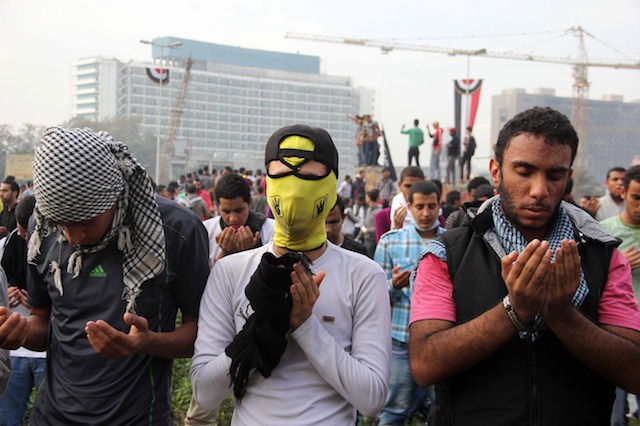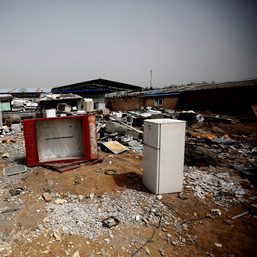SUMMARY
This is AI generated summarization, which may have errors. For context, always refer to the full article.

CAIRO, Egypt – Egypt’s constitution-drafting panel approved a charter Sunday, December 1, that preserves the military’s wide-ranging powers, including the ability to try civilians, as police fired tear gas to disperse Islamists in Tahrir Square.
The charter will be submitted to a popular referendum early next year that has been billed as the first stage in a “democratic transition” promised by the military-installed authorities following the ouster of Islamist president Mohamed Morsi in July.
The charter approved by the 50-member panel allows the military to prosecute civilians in some cases, appoint the defense minister and keep its budget beyond any civilian scrutiny – powers held by the legislature, executive and judiciary of most democracies.
More than 2,000 pro-Morsi university students meanwhile gathered in Cairo’s Tahrir Square in the biggest Islamist demonstration there since Morsi’s ouster. Tahrir was the epicenter of the 2011 revolt that toppled long-ruling president Hosni Mubarak.
Police fired tear gas to disperse the protesters in Tahrir and another pro-Morsi demonstration near the High Court, with security forces and Morsi opponents chasing the Islamists through downtown streets filled with tear gas and smoke from burning tires, the violence underscoring Egypt’s severe polarization.
Morsi, Egypt’s first democratically elected president, was overthrown on July 3, and in mid-August the security forces launched a sweeping crackdown on his supporters which has left more than 1,000 people killed and thousands more jailed.
On Sunday, authorities extended the detention of prominent secular activist Alaa Abdel Fattah by 15 days after he was arrested for holding an unauthorized demonstration against the provision in the draft charter allowing military trials of civilians.
His detention is expected to further anger secular activists who are furious over the provisions concerning the military. Another 24 activists also saw their detention extended by 15 days on Sunday.
The most controversial article approved by the panel on Sunday states that “no civilian can be tried by military judges, except for crimes of direct attacks on armed forces, military installations and military personnel.”
Secular activists had demonstrated against the provision, fearing it could be applied to protesters, journalists and dissidents like Abdel Fattah, who is accused of breaking a new protest law, inciting protesters to riot and block roads, and beating a police officer.
Another top activist, Ahmed Maher, was freed Sunday after he turned himself in the day before following an order for his arrest.
A law passed earlier this month, which requires permits for all public gatherings, has angered secular and human rights groups, especially since the military justified its removal of Morsi by saying it was responding to mass protests.
On Sunday the army came in for more criticism from Human Rights Watch, which accused it of “forcibly disappearing” five top Morsi aides since his ouster.
The constitution panel approved an article stipulating that the defense minister be appointed in agreement with the military, although panel spokesman Mohammed Salmawy told Agence France-Presse this clause will only apply during the first two presidential terms.
Army chief and defense minister General Abdel Fattah al-Sisi is hugely popular and seen as the real power behind the interim government after he led Morsi’s ouster.
Referendum seen as real test
The transition road map calls for the constitutional referendum to be followed by parliamentary and presidential elections in mid-2014, but the panel rejected the timeline set forth in the draft charter, meaning the votes could be delayed.
Political analyst Hassan Nafea said the constitutional provisions concerning the army will “trigger debates among the secular camp,” much of which supported Morsi’s ouster.
Nafea, professor of political science at Cairo University, said the referendum will be the real test of the charter.
“I am not sure the constitution would be passed with a big majority by the Egyptian people… when (the) nation is polarized. People will not vote on the basis of whether the constitution is good or bad, but… on the basis of which camp you belong to,” he said.
The interim authorities suspended the constitution written under Morsi after his removal. That charter had been drafted by a 100-member panel dominated by his Islamist allies.
The current panel includes representatives from civil society, political parties, institutions including the army and police, and the Coptic church.
It has just two Islamists, neither of whom is from Morsi’s Muslim Brotherhood, which won a series of polls after Mubarak’s ouster. – Rappler.com
Add a comment
How does this make you feel?
![[OPINION] Fossil fuel debts are illegitimate and must be canceled](https://www.rappler.com/tachyon/2024/04/IMHO-fossil-fuel-debt-cancelled-April-16-2024.jpg?resize=257%2C257&crop_strategy=attention)
![[WATCH] John Kerry: You can’t solve climate crisis without addressing ocean’s challenges](https://www.rappler.com/tachyon/2023/12/cop28-united-states-john-kerry-december-2-2023-reuters-001.jpg?resize=257%2C257&crop_strategy=attention)



There are no comments yet. Add your comment to start the conversation.